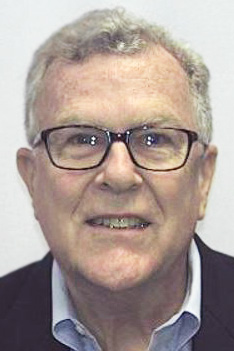

New TLDs |
Sponsored by |

|


 2020 has been extremely eventful, so it follows that the domain industry has continued to experience perpetual change, progress and uncertainty in the last three months of the year. In our Q4 New gTLD Quarterly Report, MarkMonitor experts analyze topical registration activity, launch information, .brand growth and DNS abuse, and share a list of upcoming industry meetings for 2021.
2020 has been extremely eventful, so it follows that the domain industry has continued to experience perpetual change, progress and uncertainty in the last three months of the year. In our Q4 New gTLD Quarterly Report, MarkMonitor experts analyze topical registration activity, launch information, .brand growth and DNS abuse, and share a list of upcoming industry meetings for 2021.
 The domain name system is not the place to police speech. ICANN is legally bound not to act as the Internet's speech police, but its legal commitments are riddled with exceptions, and aspiring censors have already used those exceptions in harmful ways. This was one factor that made the failed takeover of the .ORG registry such a dangerous situation. But now, ICANN has an opportunity to curb this abuse and recommit to its narrow mission of keeping the DNS running...
The domain name system is not the place to police speech. ICANN is legally bound not to act as the Internet's speech police, but its legal commitments are riddled with exceptions, and aspiring censors have already used those exceptions in harmful ways. This was one factor that made the failed takeover of the .ORG registry such a dangerous situation. But now, ICANN has an opportunity to curb this abuse and recommit to its narrow mission of keeping the DNS running...
 We used to think of computer networks as being constructed using two fundamental common infrastructure components: names and addresses. Every connected device had a stable protocol address to allow all other devices to initiate a communication transaction with this device by addressing a data packet to this protocol address. And every device was also associated with a name, allowing human users and human use applications to use a more convenient alias for these protocol addresses.
We used to think of computer networks as being constructed using two fundamental common infrastructure components: names and addresses. Every connected device had a stable protocol address to allow all other devices to initiate a communication transaction with this device by addressing a data packet to this protocol address. And every device was also associated with a name, allowing human users and human use applications to use a more convenient alias for these protocol addresses.
 After two decades of involvement with ICANN, I am stepping down from the Board of Directors, where I served for nine years. I have spent considerable time of late reflecting on the past 20 years, and I have isolated some memories that help frame my time with ICANN. ... November 2000, ICANN07 in Marina del Rey, California - With only a scant idea of what ICANN is all about, I am warmly welcomed by the flag-wearing country code top-level domain (ccTLD) community, who come to ICANN to ensure that nothing happens to affect the independence of ccTLDs...
After two decades of involvement with ICANN, I am stepping down from the Board of Directors, where I served for nine years. I have spent considerable time of late reflecting on the past 20 years, and I have isolated some memories that help frame my time with ICANN. ... November 2000, ICANN07 in Marina del Rey, California - With only a scant idea of what ICANN is all about, I am warmly welcomed by the flag-wearing country code top-level domain (ccTLD) community, who come to ICANN to ensure that nothing happens to affect the independence of ccTLDs...
 As the third quarter of 2020 winds down, the domain industry continues to show development and progression amid uncertain global economic conditions. From improvements in products and additional TLD launches to growth in .brand email usage and upcoming virtual meetings, the Q3 2020: New gTLD Quarterly Report from our MarkMonitor team has a little something for everyone.
As the third quarter of 2020 winds down, the domain industry continues to show development and progression amid uncertain global economic conditions. From improvements in products and additional TLD launches to growth in .brand email usage and upcoming virtual meetings, the Q3 2020: New gTLD Quarterly Report from our MarkMonitor team has a little something for everyone.
 With DNS abuse a topic of increased concern throughout the community, any controversy over adopting the Uniform Rapid Suspension System (URS) for all generic top-level domains (gTLDs) seems misplaced. The URS was designed as a narrow supplement to the Uniform Domain-Name Dispute Resolution Policy (UDRP), applicable only in certain tightly defined circumstances of clear-cut and incontrovertible trademark infringement involving the registration and use of a domain name.
With DNS abuse a topic of increased concern throughout the community, any controversy over adopting the Uniform Rapid Suspension System (URS) for all generic top-level domains (gTLDs) seems misplaced. The URS was designed as a narrow supplement to the Uniform Domain-Name Dispute Resolution Policy (UDRP), applicable only in certain tightly defined circumstances of clear-cut and incontrovertible trademark infringement involving the registration and use of a domain name.
 Three years ago, the first Internet-Draft on Registry Maintenance Notifications for the Extensible Provisioning Protocol (EPP) was published, which will become a Request for Comments (RFC). The IETF Registration Protocols Extensions (REGEXT) working group is the home of the coordination effort for standards track EPP extensions. They released eight RFCs over the last couple of years, and they are currently working on more than 15 Internet-Drafts.
Three years ago, the first Internet-Draft on Registry Maintenance Notifications for the Extensible Provisioning Protocol (EPP) was published, which will become a Request for Comments (RFC). The IETF Registration Protocols Extensions (REGEXT) working group is the home of the coordination effort for standards track EPP extensions. They released eight RFCs over the last couple of years, and they are currently working on more than 15 Internet-Drafts.
 The Internet Commerce Association has been actively involved for the last four years on the ICANN Working Group reviewing the Uniform Rapid Suspension (URS) policy and the Uniform Domain Name Dispute Resolution Policy (UDRP). The Working Group is currently wrapping up its review of the URS. The UDRP will be reviewed in an upcoming second phase.
The Internet Commerce Association has been actively involved for the last four years on the ICANN Working Group reviewing the Uniform Rapid Suspension (URS) policy and the Uniform Domain Name Dispute Resolution Policy (UDRP). The Working Group is currently wrapping up its review of the URS. The UDRP will be reviewed in an upcoming second phase.
There are two kinds of new domain name extensions: those dedicated to selling domain names through the network of accredited Registrars and those dedicated to a personnel use. I call these "dotBRANDs" or ".brand" new gTLDs since they are used - most of the time - by Trademarks for their own benefit. This article focuses on .BRAND new generic Top-Level Domains. In the ICANN vocabulary, these are "Registry Agreements with Specification 13".
 This isn't the blog post I had hoped to write. When I signed up to participate in ICANN's Expedited Policy Development Process for gTLD Registration Data, I knew we had a lot of work ahead of us, but I was cautiously optimistic that we would, eventually, reach a successful outcome. Today, I find myself looking at things differently. After hundreds of hours and countless meetings and emails, Phase 2 of the EPDP's work has wrapped up with the delivery of our final report to the GNSO Council.
This isn't the blog post I had hoped to write. When I signed up to participate in ICANN's Expedited Policy Development Process for gTLD Registration Data, I knew we had a lot of work ahead of us, but I was cautiously optimistic that we would, eventually, reach a successful outcome. Today, I find myself looking at things differently. After hundreds of hours and countless meetings and emails, Phase 2 of the EPDP's work has wrapped up with the delivery of our final report to the GNSO Council.